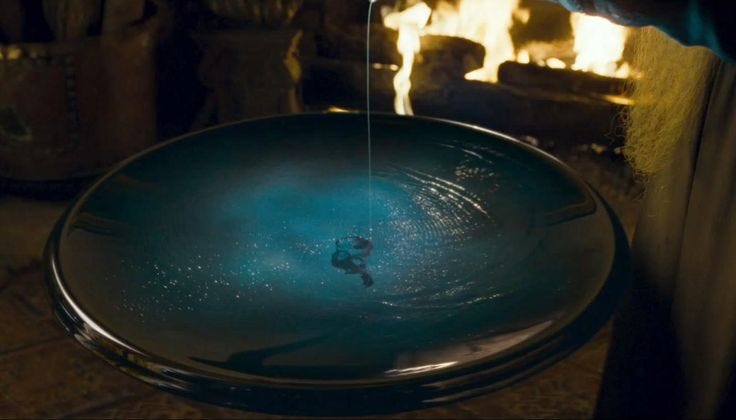Unleashing Your Inner Wizard: How Journaling Can Teach You Magic As a Muggle
How journaling can be your secret weapon to enter the wizarding world.

Journaling changed my life.
I started journaling several months ago with no big expectations. I just wanted to remember my tasks and maybe write down some thoughts. I thought it could be cool to read them in the future.
I didn’t realize the effect journaling had on me until a few weeks later.
The Pensieve
People fail at journaling because they have the wrong idea.
Some people, including me in the beginning, use their journals exclusively to write tasks. Using your journal as a TODO list is very limiting. The real power of journaling is to be your personal Pensieve.
As a big Harry Potter fan, I’ve always envied Albus Dumbledore’s Pensieve.
Let me explain if you don’t know what I am talking about. In Harry Potter, the school’s principal, Albus Dumbledore, has a plate called the Pensieve. He could use his magical wand to take memories from his mind and put them into the Pensieve. When memory is on the Pensieve, he could look at it as if looking through a window and even jump into it to live the memory again as an invisible and untouchable presence.
Unfortunately, that doesn’t exist.
But, even if Harry loved using the Pensieve to jump into memories, the real purpose of the Pensieve was another one.
“I use the Pensieve. One simply siphons the excess thoughts from one's mind, pours them into the basin, and examines them at one's leisure. It becomes easier to spot patterns and links, you understand, when they are in this form.”
Harry Potter and the Goblet of Fire
The above quote is from Albus Dumbledore. He explains that he used the Pensieve mainly to unload his mind when he had too many thoughts. He used to take memories into the Pensieve to analyze them from a different perspective.
Journaling is a way to analyze your thoughts and memories in your Pensieve.
Unloading your mind
“I have limited RAM.”
A friend said this quote in a meeting and explained why he couldn’t complete a task. We cannot remember everything, and our minds have limited memory space. There is some space dedicated to things we will remember over the years and some space for things we might forget in a few hours.
Short living memory makes our brain waste a lot of energy.
That memory is not only for tasks but also for considerations and thoughts related to things happening. I find myself thinking a lot while people are speaking or while I work. Those thoughts are not necessarily things I have to do. They might be ideas or opinions I have at that moment.
I don’t want to lose ideas and opinions generated in a situation.
Writing those thoughts in my journal ensures they are safe, and I don’t need to think about them to avoid constantly forgetting them. Focusing on something is tiring; writing on a note, instead, gives me the same feeling I associate with the Pensieve. I can unload my mind because I know my thoughts are safe.
Writing things down unloads your mind.
A different perspective
Reading your notes is not only great for remembering things but also for analyzing them.
Imagine living a particularly intense week. Many things happened at work, and many meaningful conversations took place. You need a weekend to relax, and it makes perfect sense.
What happens when you come back to think about the past week?
In the best-case scenario, you remember everything. Nobody can do that but assume you are a superhuman with limitless memory. Even if you remember every single detail of your week, you are still the protagonist of your memories.
When you think about your memories, you only have one perspective.
When Dumbledore jumps into his memories floating inside the Pensieve’s surface, he lives them as a spectator. Even if they are memories he lived in the past, he can look at the same things from a different perspective. He can live a moment that happened years before and analyze the situation with his new experience.
Journaling makes you live your memories from a different perspective.
Reading your notes of the past week, month, or even day gives you the perspective of your past self. You are not the same person who wrote those notes; you have new experiences, and your mind is not inside the action. While living the situation, you don’t have time to think calmly.
You can only think quickly and react when you live in a situation.
You can pause anytime while reading thoughts, ideas, and memories of a past situation. You can choose to focus on a specific line and skip another one. You can also select the order of the things.
When you live in the moment, things happen one after the other.
You can read your notes in any order. Things that look important in a situation might become less relevant with new experiences. This is the magic of journaling.
Journaling is your personal Pensieve.
Did you like this post? Would you like more posts on this topic? Are you interested in my journaling process? Let me know in the comments.



